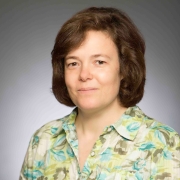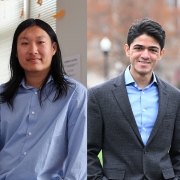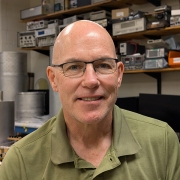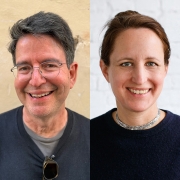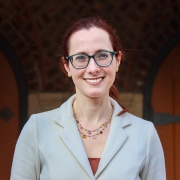Penn Among Education Partners in Mid-Atlantic Clean Hydrogen Hub (MACH2) to Advance Clean Energy
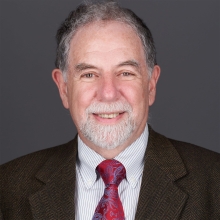
The University of Pennsylvania will serve as an education partner in support of workforce development efforts with the Mid-Atlantic Clean Hydrogen Hub (MACH2), a partnership that will receive up to $750 million in U.S. Department of Energy (DOE) funding through the historic Regional Clean Hydrogen Hubs program. The program, announced by the DOE on October 13, 2023, is awarding up to $7 billion in grants.
MACH2 will aid in the creation of a clean hydrogen hub—a network of hydrogen producers, consumers, and local connective infrastructure—in Delaware, southeastern Pennsylvania, and southern New Jersey. It is one of seven U.S. hydrogen hubs to receive funding. In this effort, Penn will work in partnership with Drexel University, the University of Delaware, Cheyney University, and Rowan University.
Eric Detsi, Associate Professor in Materials Science and Engineering (MSE) in Penn Engineering, will lead the work for Penn and Drexel. Additional Penn researchers involved include Tom Mallouk, Vagelos Professor in Energy Research and Chair of the Department of Chemistry in Penn Arts & Sciences, and John Vohs, Carl V. S. Patterson Professor in Chemical and Biomolecular Engineering and co-director of the Vagelos Integrated Program in Energy Research. Detsi, Mallouk, and Vohs are each faculty members of Penn’s Vagelos Institute for Energy Science and Technology, which facilitated the partnership with MACH2.
“The University of Pennsylvania is thrilled to contribute to the goals of MACH2 to advance clean hydrogen energy. With partners in the hub, we will develop groundbreaking research that generates technologies and implementation that can transform the energy base of the region,” says Dawn Bonnell, Penn’s Senior Vice Provost for Research and Henry Robinson Towne Professor in MSE. “We will help develop educational programs that support the new workforce. The opportunity for academic institutions to collaborate with industry partners and the community is exciting and the best path to success.”
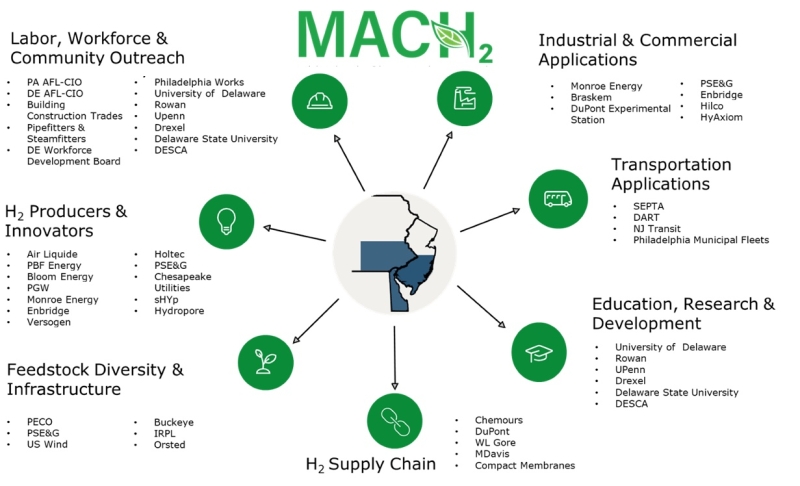
Hydrogen is the most abundant element in the world, and the DOE is working to accelerate its use as a clean energy source. “Unlocking the full potential of hydrogen, a versatile fuel that can be made from almost any energy resource in virtually every part of the country, is crucial to achieving President Biden’s goal of American industry powered by American clean energy, ensuring less volatility and more affordable clean energy options for American families and businesses,” says U.S. Secretary of Energy Jennifer M. Granholm. “With this historic investment, the Biden-Harris Administration is laying the foundation for a new, American-led industry that will propel the global clean energy transition while creating high-quality jobs and delivering healthier communities in every pocket of the nation.”
MACH2 will encompass a network of hydrogen producers, consumers, local connective infrastructure for hydrogen deployment, and the education and training needed to develop the region’s clean energy workforce. Funded by President Biden’s Investing in America agenda, the hydrogen hubs will accelerate the commercial-scale deployment of clean hydrogen power, create a new form of energy storage, and decarbonize heavy industry and transportation to meet President Biden’s goal of a 100 percent clean electrical grid by 2035 and net-zero carbon emissions by 2050.
“Hydrogen is a clean, carbon-free fuel that enables the long-term storage of electrical energy,” says Mallouk. “As the U.S. moves away from carbon-intensive energy use that is based on coal and oil, we need ways to store the energy produced from carbon-free resources—solar, wind, nuclear and hydroelectric—that produce electrical energy.”
As part of this effort, Penn will add a new hydrogen concentration to the curriculum of three of its bachelor’s degrees in engineering: Chemical and Biomolecular Engineering, Mechanical Engineering and Applied Mechanics, and Materials Science and Engineering.
“The U.S. will need skilled employees who can safely handle and maintain hydrogen and related technologies,” says Detsi. “The U.S. will also need well-educated professionals who can supervise these skilled workers, and who can resolve technical, economic, regulatory, and policy issues within the sector. Penn and the other partners involved will play a key role in training this hydrogen workforce and its leaders.”
